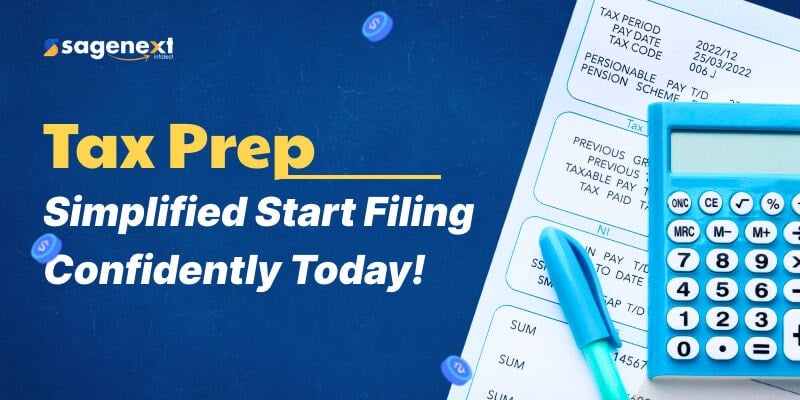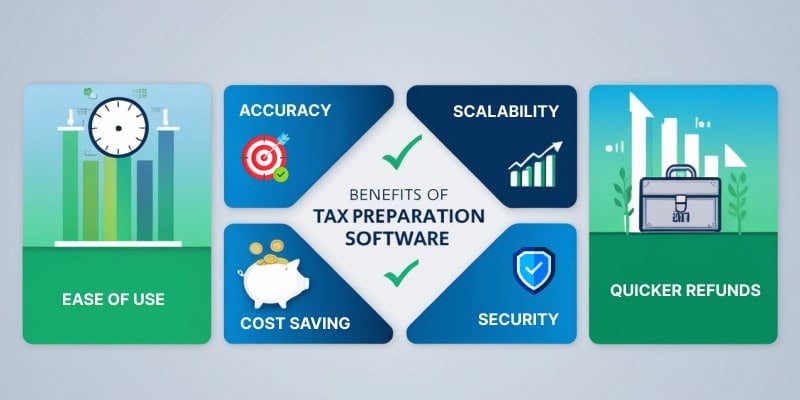
Tax Preparation Made Simple | A Guide for Businesses and Beginners
Key Takeaways: Reading this article you’ll be able to know the essentials of tax preparation, how professional tax preparers add value and understand the tips to streamline the process using technology and expertise.
Overview
As tax season approaches near, effective tax preparation becomes essential for companies of all sizes. An effective planning for tax preparation can help you save time, minimize errors, and increase returns whether you’re handling documents, managing papers or looking into resources like tax preparation software. Whether you file taxes independently or engage a professional tax preparer, understanding the tools, regulations, and resources available is important because tax preparation is essential for businesses to maintain compliance and optimize their financial health. This guide explores the role of tax preparers, various certifications, and strategies for efficient tax preparation. It outlines the necessary procedures and steps to help you proceed towards a stress-free tax season.
How to Prepare for the Current Tax Season
Effective tax management is a crucial requirement for business owners. Considering the recent IRS revisions and changing tax laws, it is particularly important to remain prepared to maintain compliance and maximize deductions. A revised and updated guide on tax preparation for this season is provided below, which includes key strategies, tools, and professional insights to help you get started with your tax preparations easily.
Why Tax Preparation Matters
Tax management calls for experience, although a sizable number of business owners are able to manage multiple responsibilities on their own. Submitting precise returns in compliance with IRS regulations is an intricate process. Errors may result in penalties, forfeited deductions, or missed credits. Tools such as tax preparation software and professional guidance can help streamline this process of preparation and filing.
Essential Tax Preparation Tips
- Stay Organized Round the Year: Tracking income and expenses is simplified by digital solutions, such as Quickbooks or other hosted tax software. Records that are well-organized minimize errors and help in expediting the filing process.
- Stay Updated on Tax Reforms: Tax regulations undergo regular modifications. For instance, credits and deductions were affected by changes made under the Tax Cuts and Jobs Act. Staying informed is crucial for ensuring that filing is accurate.
- Estimate and Pay Quarterly Taxes: Estimated taxes should be calculated and paid quarterly to avoid surprises or unexpected disappointments during tax season. Review and examine previous year’s data take into consideration any adjustments to income, deductions, or credits.
- Understand Business Liabilities: Evaluate and access liabilities, such as capital gains or employee taxes. Making a plan in advance helps to prevent unforeseen expenses and guarantee precise payments.
- Track Deductibles and Expenses: Deductible expenditures, such as travel, equipment, and renovations help minimize the taxable income. Check with your tax preparer to see if you qualify for any deductions.
- Plan Business Investments Strategically: Deductions may be available for purchases such as renovations to property or upgrades to equipment. Additionally, plan substantial expenditures with the assistance of a professional advisor to maximize tax savings.
- Evaluate Pass-Through Status: Businesses that meet the criteria may deduct up to 20% of their Qualified Business Income (QBI). Confirm your eligibility based on the kind of your business and income level.
- Seek Professional Assistance: Professionals who specialize in tax preparation have a deep understanding of intricate and complex tax codes and reforms. Professional advice helps in ensuring error-free returns, regardless of whether you’re filing on your own or require assistance navigating adjustments.
Benefits of Tax Preparation Software

Investing in tax preparation software offers a range of advantages that simplify and streamline the tax filing process:
- Accuracy: Automated calculations reduce the risk of manual errors, ensuring compliance and precision in filings.
- Convenience: Cloud-hosted solutions enable real-time collaboration and access from anywhere.
- Scalability: Software adapts to growing business needs, accommodating increased data and users.
- Cost Savings: By automating tasks, businesses save time and resources compared to manual filing methods.
- Quicker Refunds: E-filing capabilities expedite tax processing and refunds.
- Ease of Use: Intuitive interfaces simplify complex tax procedures, even for non-experts.
- Security: Advanced encryption protects sensitive client and financial data, ensuring compliance with privacy standards.
Free or paid solutions, like TurboTax or ProSeries, cater to diverse business structures and simplify filing.
What Does a Tax Preparer Do?
Professional tax preparers help in the preparation, calculation, and submission of precise and accurate tax returns for individuals and enterprises. Additionally, depending on their skills and credentials, they might also represent clients before the IRS.
Key tasks include:
- Tax Calculation: Reviewing income, expenses, and deductions to determine tax obligations.
- Compliance: Ensuring adherence to IRS regulations and avoiding penalties.
- Representation: Some preparers can handle audits, appeals, or payment issues.
Tax preparers may specialize in specific areas, like small business taxation, individual tax returns, or specialized services like helping elderly people, retirees or start-ups.
Types of Tax Preparers and Certifications
Understanding the different types of preparers helps businesses choose the right professional:
- Enrolled Agents (EA): EAs are the one who are permitted to represent their clients and customers in audits, collections, and appeals by their federal IRS license. Becoming an Enrolled Agent necessitates passing the IRS Special Enrollment Examination and completing suitability assessments.
- Certified Public Accountants (CPA): Certified Public Accountants (CPA) manage taxation and oversee detailed and broader financial services. Certification necessitates state-specific education and coursework, examinations, and licensure.
- Annual Filing Season Program (AFSP) Participants: Non-credentialed preparers who complete yearly tax law training and testing education and exam are recognized by this IRS program.
- Electronic Return Originators (ERO): Authorized providers for electronic tax filing & submissions. They file their taxes with the IRS efficiently and securely.
Essential Tools for Tax Preparation
Expert and professional tax preparers use resources and tools like tax software to help with tax return filing in an efficient manner. Their categories include Enrolled Agents (EA), Certified Public Accountants (CPA), Annual Filing Season Program participants, and Electronic Return Originators. To become a preparer, one must obtain a PTIN and may also obtain certifications for specialized services. Essential competencies and skills include communication, understanding of tax laws, and proficiency using secure technology. Tax preparers manage and handle forms such as 1040 and 1099 and as per 2023 data these tax preparers on an average have charged $248 for each return. The tax professionals also need to remain updated on various changes in tax laws and legislation through ongoing education and IRS updates.
To streamline operations and improve accuracy, tax preparers rely on:
- Tax Software: Solutions like TaxWise automate calculations, ensure secure e-filing, and incorporate real-time tax law updates.
- PTIN and EFIN Numbers: A PTIN is required for preparing federal returns, while an EFIN allows preparers to e-file electronically.
- Research Tools: Integrated tools help preparers reference the tax code and find answers to complex client questions.
- Security Features: Advanced End-to-end Encryption and compliance features protect sensitive client data.
Skills and Requirements for Tax Preparers
Successful tax preparers possess a combination of technical and interpersonal skills:
- Communication: Essential for explaining complex tax concepts to clients in a clear, concise manner.
- Tax Law Expertise: Keeping up with IRS updates ensures compliance and maximizes deductions.
- Client Management: Building trust and maintaining long-term client relationships is key for business growth.
Average Costs and Client Expectations
In 2023, the mean expense for tax preparation for individual returns was around $248, however costs fluctuate depending on the complexity of the returns and proficiency of the tax preparer and consultants. Companies frequently incur higher costs for customized services that help improve deductions and credits.
Staying Updated with Tax Law Changes
Tax laws evolve regularly, and staying informed is crucial for both preparers and businesses. Recommended methods include:
- Attending IRS webinars and industry events.
- Subscribing to professional newsletters.
- Leveraging tax software with integrated updates.
Conclusion
In addition to maximizing financial benefits and earnings, efficient tax preparation helps maintain tax compliance and saves time. Staying informed, organized, and prepared is essential, whether you’re making use of professional-grade software, leveraging free tax preparation tools and resources, or taking expert advice. With the help of appropriate strategies and tactics, you can minimize your stress and focus on developing your business throughout the tax season.
Frequently Asked Questions
What are the most important things to keep in mind when preparing my taxes?
In order to prepare taxes, it is necessary to adhere to IRS guidelines and deadlines, maintain records of income, expenses and deductions year-round in an organized approach. Understanding current tax laws and its implications on filing is important. Seeking professional assistance or using trusted and reliable tax software can also help ensure accuracy and compliance.
Is tax software a good option for preparing my taxes?
Tax software is an exceptional choice as it streamlines and simplifies complex returns and automates computations, provides intuitive interfaces and saves time. Cloud-based platforms enable real-time collaboration and secure access, making them ideal for both individuals and enterprises.
What are the benefits of using tax preparation software or hosted solutions?
Tax preparation software improves accuracy by minimizing manual errors, saves time and streamlines the filing process. Hosted solutions facilitate scalability, ensure secure data management, and expedite refunds through streamlined and optimized e-filing procedures. For organizations of any size, these tools are both adaptable and cost-effective.







